Who is the blogger?
SNAM Video Trailer Collection Alphabetical Listing
Video Trailers from picks on TVOntario's Saturday Night at the Movies
Entries in Drama (31)
East of Eden (1955)
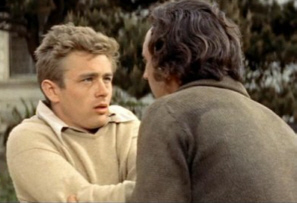 James Dean gives an exceptional performance in this now classic film of John Steinbeck’s classic novel of the same name. A movie well worth seeing, “ East of Eden”, with a strong supporting performance from Julie Harris as Abra, shows off Jimmy Dean with sophistication and poise in his “rebel” character. Presented as one of a trilogy of films directed by Elia Kazan on TVO’s Saturday Night at the Movies.
James Dean gives an exceptional performance in this now classic film of John Steinbeck’s classic novel of the same name. A movie well worth seeing, “ East of Eden”, with a strong supporting performance from Julie Harris as Abra, shows off Jimmy Dean with sophistication and poise in his “rebel” character. Presented as one of a trilogy of films directed by Elia Kazan on TVO’s Saturday Night at the Movies. They were at it again - my two munchkins brawling in the backseat: “She did it to me first!” – “But he said that I was a . . .” – “She has her stuff on my side!” – And on and on it goes. Often enough it comes to blows before the emotions of the moment blow over. Sibling rivalry, common enough phenomenon that it is, can be so draining for a parent. . . .
<<Read the rest of the archived entry for "East of Eden" on Midnight Oil
>>On to "Who's Directing Your Life?"
Video preview from TVO here.
Catch the video trailer for "East of Eden" here.
Elmer Gantry (1960) and The Swimmer (1968) Video Trailer
Burt Lancaster does some very interesting work in both "Elmer Gantry" (1960) INDb and "The Swimmer" (1968) INDb. Both films prove to be revelatory in both the figurative and the literal sense:) These screen adaptations of literary vehicles might leave you slightly off balance, but still glued to the screen.
«« Back to the "Elmer Gantry" entry on Midnight Oil.
>>On to "Who's Directing Your Life?"
Related Reading:
- Lancaster, 55 at the filming of “The Swimmer” and obviously a fine specimen, had a lifelong commitment to physical fitness starting with his first career as a circus acrobat. In spite of his athletic workouts, Burt had emergency quadruple bypass surgery at 70. Go figure!
- Religion is nothing but a pack of problems: "The End of Religion"
- True religion: an oxymoron? (Hit the "expand" button for full context)
- Loved that white robe on Sister Sharon Falconer: on exercising discernment with angelic messengers – How do you know what is and isn’t a false gospel? What about when sincere Christians fall into error?
- A skeptic's quest for authentic religion
- “I struggled with church. . . Shortly after becoming a Christian, I had to commit myself to not placing my faith in the Christians around me in order to not lose my faith.”: Tyrone
Georgy Girl (1966)
 Before there was an “Ugly Betty”, there was “Georgy Girl” (1966). The film lights down in London town during those mad 1960s with the crazy new sounds coming out of bands like “The Seekers” and the even crazier new hairdos and mini skirts. We see Georgy girl (Lynn Redgrave) awkwardly sporting one of the new “dos” as the opening credits roll over top of the chart topping
Before there was an “Ugly Betty”, there was “Georgy Girl” (1966). The film lights down in London town during those mad 1960s with the crazy new sounds coming out of bands like “The Seekers” and the even crazier new hairdos and mini skirts. We see Georgy girl (Lynn Redgrave) awkwardly sporting one of the new “dos” as the opening credits roll over top of the chart topping 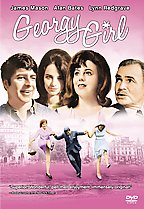 number by the Australian band. (I was surprised to learn that they weren’t a part of the British invasion.) The film is a lot like the title song in that it is a lighthearted romp with surprisingly serious undertones for those who are really listening.
number by the Australian band. (I was surprised to learn that they weren’t a part of the British invasion.) The film is a lot like the title song in that it is a lighthearted romp with surprisingly serious undertones for those who are really listening.
The story line is a bit mixed up, much like Georgy herself. Georgy’s beautiful and free-spirited roommate, Meredith, leaves behind a boyfried and a baby as she gets on with her life after an ever so brief encounter with her own non-maternal nature. Georgy tries to pick up the pieces. After all, there is an adorable, helpless child involved. The make-shift domestic arrangements with Jos, the baby’s father, soon fall apart. A cast-off boyfriend doesn’t really fit any  better than the ridiculous coiffure that Georgy tries on in the film’s introduction. In true improvisational style that fits the times and Georgy’s quirky personality, she tries on a completely different set of circumstances by accepting her family’s employer as stand-in dad. James Leamington (played by James Mason) is supposedly Georgy’s better in social standing - although one wonders if he isn’t actually her “worser” after he offers her an albeit “very proper” and attractive contractual arrangement for Georgy to be his mistress. Georgy passes up the offer. She’d like to think she can do better. She changes her mind (like a girl changes clothes) when the offer firms up a bit more and becomes a proposal of marriage after Leamington’s wife conveniently takes herself out of the way by dying.
better than the ridiculous coiffure that Georgy tries on in the film’s introduction. In true improvisational style that fits the times and Georgy’s quirky personality, she tries on a completely different set of circumstances by accepting her family’s employer as stand-in dad. James Leamington (played by James Mason) is supposedly Georgy’s better in social standing - although one wonders if he isn’t actually her “worser” after he offers her an albeit “very proper” and attractive contractual arrangement for Georgy to be his mistress. Georgy passes up the offer. She’d like to think she can do better. She changes her mind (like a girl changes clothes) when the offer firms up a bit more and becomes a proposal of marriage after Leamington’s wife conveniently takes herself out of the way by dying.
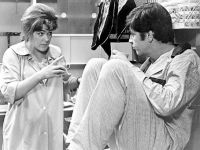 In the end, it is a marriage of convenience that Georgy chooses as her best fit in the era of the sexual revolution. It is perhaps the best option afforded to someone like Georgy “who just missed being beautiful”. One wonders how well this arrangement is going to work out over time, as we watch the closing scene where the new bride repeatedly caresses her adopted infant. She seems oblivious to the groom sitting next to her in the get away car. It may well end up as just another failed experiment to be washed away down the drain along with the hair pins and mascara of Georgy’s “new look” in the opening scene.
In the end, it is a marriage of convenience that Georgy chooses as her best fit in the era of the sexual revolution. It is perhaps the best option afforded to someone like Georgy “who just missed being beautiful”. One wonders how well this arrangement is going to work out over time, as we watch the closing scene where the new bride repeatedly caresses her adopted infant. She seems oblivious to the groom sitting next to her in the get away car. It may well end up as just another failed experiment to be washed away down the drain along with the hair pins and mascara of Georgy’s “new look” in the opening scene.
Georgy’s pick of the best offer out of a limited range of options appears to be missing something: unconditional commitment and acceptance of people for who they really are. It’s what Georgy really wants; it’s what all of us want in the end –free love.
Don’t miss the SNAM Interviews on the subject of “Beauty -and Other Myths”. The Interviews deal extensively with another movie with a parallel theme shown in conjunction with “Georgy Girl” The second feature was “Dogfight”.
>>Real Life: Michelle participated in “The Biggest Loser” contest in order to lose weight. She found unexpected healing that led to a more permanent change in her life.
>>More to see: Looking for more out of life?
See the TVO video trailer for "Georgy Girl" (1966)
I Confess (1953)
 “I Confess” (1953) with Montgomery Clift, Anne Baxter, and Karl Malden makes for a rather melodramatic situation where the real murderer uses the silence of the confessional as the perfect cover-up for his crime. Alfred Hitchcock’s direction on site in Quebec City gives this film a bit of a different perspective. Once you realize that the setting is supposed to be Quebec City during the 1950’s in the pre-Vatican II Duplessis era, it all starts to make a little more sense – the film, that is, not the murder mystery plot. The murder, cover-up, romance, blackmail and dénouement are all very predictable. What else can we expect when two excruciatingly
“I Confess” (1953) with Montgomery Clift, Anne Baxter, and Karl Malden makes for a rather melodramatic situation where the real murderer uses the silence of the confessional as the perfect cover-up for his crime. Alfred Hitchcock’s direction on site in Quebec City gives this film a bit of a different perspective. Once you realize that the setting is supposed to be Quebec City during the 1950’s in the pre-Vatican II Duplessis era, it all starts to make a little more sense – the film, that is, not the murder mystery plot. The murder, cover-up, romance, blackmail and dénouement are all very predictable. What else can we expect when two excruciatingly 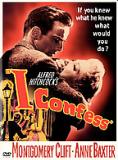 beautiful people such as Anne Baxter and Montgomery Clift are caught up in a thoroughly impossible situation? It is all completely incomprehensible and implausible in today’s world until you remember that this is supposed to be Quebec in the 1950’s. The prominent landmarks and buildings seen in the film are still there today. (Our family visits quite regularly.) The social and religious landscapes that make this film believable are not. C’est quoi encore le dicton en anglais? “Much Ado About Nothing”?
beautiful people such as Anne Baxter and Montgomery Clift are caught up in a thoroughly impossible situation? It is all completely incomprehensible and implausible in today’s world until you remember that this is supposed to be Quebec in the 1950’s. The prominent landmarks and buildings seen in the film are still there today. (Our family visits quite regularly.) The social and religious landscapes that make this film believable are not. C’est quoi encore le dicton en anglais? “Much Ado About Nothing”?
>>More to see: Looking for more out of life?
See the film trailer for "I Confess" (1953).
Kiss of Death (1947) Video Trailer
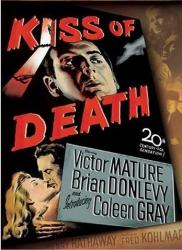 “Kiss of Death” (1947)INDb starring Victor Mature with Karl Malden is overshadowed by the Tommy Udo character played by Richard Widmark. Widmark is unforgettable as the sneering psychopath who inhabits this film. The movie is constructed so that we’re supposed to cheer for the ex-con, Nick Bianco (Mature) and his new love (Coleen Gray) as they try to make a new life for their family far away from the criminal past. Suspense builds as Tommy Udo swears revenge on Nick Bianco for turning him in to the police and then goes on the
“Kiss of Death” (1947)INDb starring Victor Mature with Karl Malden is overshadowed by the Tommy Udo character played by Richard Widmark. Widmark is unforgettable as the sneering psychopath who inhabits this film. The movie is constructed so that we’re supposed to cheer for the ex-con, Nick Bianco (Mature) and his new love (Coleen Gray) as they try to make a new life for their family far away from the criminal past. Suspense builds as Tommy Udo swears revenge on Nick Bianco for turning him in to the police and then goes on the 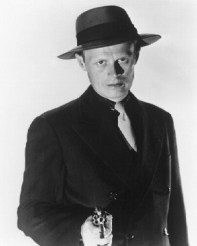 hunt for his family. It ends up that it’s Widmark who makes an indelible impression on people’s minds and on film history, and not the “good guy” who gets the girl and the happy ending.
hunt for his family. It ends up that it’s Widmark who makes an indelible impression on people’s minds and on film history, and not the “good guy” who gets the girl and the happy ending.
See the SNAM blog authored by Thom Ernst on a dedication to the recently passed Richard Widmark.
<<Back to Midnight Oil main journal
>>On to "Who's Directing Your Life?"
Catch the infamous "wheel chair scene" on video from “Kiss of Death” (1947)





